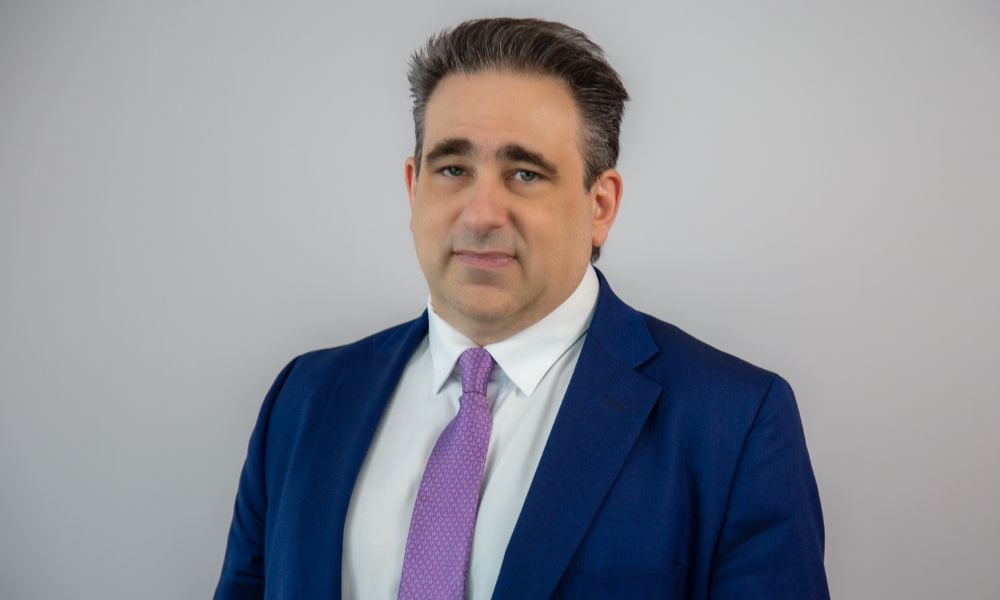CIBC head and managing director Carlo DiLalla outlines strategies the institution is doing to help with the "growing emphasis on portfolio diversification"

As many in the industry will attest, the financial world can be complex to navigate. But Carlo DiLalla’s journey is one that has been focused on adaptability, strategic foresight, and a passion for client-centered solutions. As managing director and head of institutional asset management at CIBC Asset Management, DiLalla has spent over a decade navigating the complexities of financial markets, guiding his team, and providing tailored solutions for institutional clients.
At the core of DiLalla’s work is a genuine passion for helping clients achieve their financial objectives. "I really enjoy working with clients and helping them achieve their objectives," DiLalla attests. “That’s been the cornerstone of what I do and it's [both] challenging and exciting. It allows me to use my skills and orient my team's capabilities as well.”
Under his leadership, CIBC Asset Management has strategically positioned its fixed-income portfolios to benefit from the fluctuating interest rate environment. "The interest rates we have today are a welcome position where fixed income is earning its income," DiLalla remarks as his team anticipated a slight decline in rates from their recent highs. As a result, there’s been a trend of reallocating to fixed income altogether.
He explains that the income portion of fixed income is higher and contributes to total returns, which has also renewed the appeal to institutional investors. “It now plays its role as diversifier like it used to play.” DiLalla remains cautious, however, acknowledging that rates could continue falling, as the possibility of a recession looms on the horizon.
He also acknowledges a growing emphasis on portfolio diversification, with many clients seeking to reduce risk through exposure to hedge fund-like strategies and private investments. He says investors have already made the move to allocate from traditional securities to private funds, and now looking for further diversification with hedge fund-like strategies, “where correlations are even lower and as a result, clients can have a total portfolio that has more risk management possibilities.”
DiLalla highlights CIBC Asset Management’s active currency strategy, which provides clients with a diversifying asset class without the need to allocate capital, noting that it’s done on an unfunded basis. “You get extra return, you get better portfolio management risk, and you get it in an efficient way without utilizing capital,” he explains.
This innovative approach has gained traction, especially outside of Canada, and now includes clients in the United States, Australia, and Japan. DiLalla’s 34-person institutional team also works closely with clients to design benchmark-oriented approaches. “We either create a liability benchmark for them and use fixed income to achieve the same objective, or we're examining their needs of short-term obligations to help them with the fixed income opportunity.”
Another interesting development is CIBC Asset Management’s private credit capability, DiLalla admits. As a bank owned asset manager, CIBC Asset Management utilizes a "One CIBC" approach to offer asset owners access to direct lending opportunities that were once only available to large bank balance sheets. He says he’s proud to offer access to the unique deal pipeline, leading underwriting and true risk alignment uniquely available through our private credit platform. “We are now entering a period where we’re allowing institutional plans to access some of our loans on the banking side," he explains. “Investors can lend alongside the bank, with economic interests aligned between CIBC's balance sheet and clients, a unique proposition in the Canadian landscape.”
Currently, the country faces a few economic pressures, as DiLalla highlights the country's weak dollar, which is hampering exports, along with the higher interest rates that are impacting mortgages and other interest-bearing products. "There's a lot to be concerned about but that said, we've had a little bit of ease with some of the rate movements, and inflation seems to be under control. That was a big concern not too long ago.”
“Economically, we've had more issues because we're more sensitive to rate increases,” he explains. “Unlike the US, where they have a 30-year mortgage, our mortgages reset every five years. Therefore, we've had more to worry about with these rate hikes, and we've had to cut whereas the U.S. central bank has been able to operate a little differently. We might continue to see that difference because our system has that bigger sensitivity to interest rates. In Canada, we are positioning for continued steepening in the curve.”
As a leader, DiLalla values strategic thinking and collaboration. He takes pride in the collective success of his team and strives to be a defender of both client and employee interests. However, he also acknowledges that leadership comes with its challenges. "Obviously, you can't have everything your way," DiLalla admits. “When the door closes on me, those days aren't as fun. And of course, the more ideas you have, the more doors that close on you. I experience that on a regular basis, but I don't give up. I keep going.”
As DiLalla reflects on his career, one of the life lessons he’s learned and indeed, the best advice he would give is to “not fear failure.”
“That’s something I experienced a lot early on in my career, and it’s guaranteed that you will fail. If you accept that notion, it changes everything in terms of your perspective about what you do next. It’s always beneficial to find out how to move forward.”
Looking ahead, DiLalla remains focused on the future and committed to his role at CIBC, which is driven by a deep sense of responsibility and a desire to deliver for his clients and his team. "I don't have a set date on retirement just yet, but I envision continuing the path that I'm on in terms of achieving the objectives and continuing the legacy of CIBC’s institutional business, which has a deep, 50-year history of being excellent," he says.
“I feel that responsibility every day, and I’m satisfied with that challenge.”



